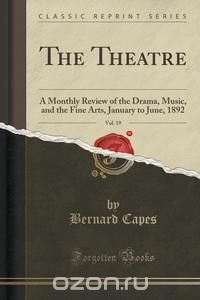Excerpt from The Theatre, Vol. 19: A Monthly Review of the Drama, Music, and the Fine Arts, January to June, 1892
The fact that it was not printed until 1638 may be ascribed to the interruptions the theatres suffered from at that period.
In the Revels' Office book is the following entry by Sir Henry Herbert, which should prove of interest. "At the increase of the plague to four within the city, and fifty-four in all, this day, the 12th May, 1636, I received a Warrant from my Lord Chamberlain, for the suppressing of Playes and Shewes, and at the same time delivered my several Warrants to George Wilson, for the four companies of players, to be served upon them." En passant it may be observed that the King's Players performed occasionally during this recess, at Hampton Court and St. James's Palace, before the Royal Family. They represented Beaumont and Fletcher's "Philaster; or, Love Lies Bleeding," at St. James's Palace, on Shrove Tuesday, February 21st, 1636-7. As the deaths from the plague decreased, the King granted the players their liberty and they began again soon after. But the fluctuations in the fatalities from the plague caused several suspensions until the 2nd October, 1637, when they again had permission to perform.
Besides the "Seven Champions of Christendoms" the Biogr. Dramatica gives no particulars as to Kirke's being the author of any other piece, though in the Revels' book of June, 1642, the following entries occur, which imply that he did compose other dramas: "Received of Mr. Kirke, for a new play, which I burnte for the ribaldry and offence that was in it, two pounds;" and again "Received of Mr. Kirke for another new play, called 'The Irish Rebellion,' the 8 June, 1G42, two pounds." The Irish Rebellion itself, it will be remembered, was at at its height at this period. In 1647-8 stage plays were wholly abolished under heavy penalties, by an ordinance which received the sanction of both Houses.
And now, after this preamble let us consider the play.
Was ever such a cast seen, unless at Pantomime time at Old Drury? Forty-seven characters and every one with something to say for himself! The quantity of thunder and lightning in the piece is appalling. Calibisan exceptionally bad lot, and uses dreadful imprecations. The whole play is a singular medley of seriousness and pathos, tragedy and farce; the ridiculous, generally speaking, is continually tripping up the heels of the sublime. For instance, after a really clever description of the pleasures and beauties of Nature's May, the witch Calib, who has stolen a child, says she is anxious to "bathe my body in his popular gore!"
About the Publisher
Forgotten Books publishes hundreds of thousands of rare and classic books. Find more at www.forgottenbooks.com
This book is a reproduction of an important historical work. Forgotten Books uses state-of-the-art technology to digitally reconstruct the work, preserving the original format whilst repairing imperfections present in the aged copy. In rare cases, an imperfection in the original, such as a blemish or missing page, may be replicated in our edition. We do, however, repair the vast majority of imperfections successfully; any imperfections that remain are intentionally left to preserve the state of such historical works. Это и многое другое вы найдете в книге The Theatre, Vol. 19 (Bernard Capes)
